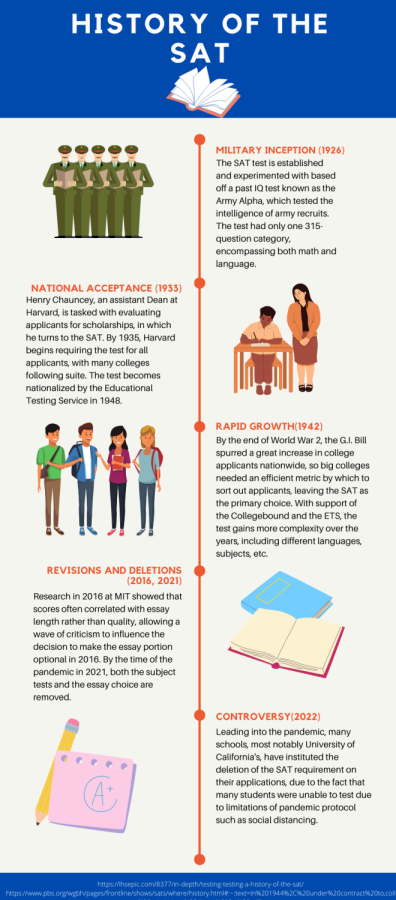Yes: SAT should be a required part of college admissions
The SAT can help gauge student ability — a part in the college admissions process.
May 9, 2022
Since the 1950s, the SAT has been normalized as one of the primary aspects of college admission for all students across America. With the deletion of the SAT requirement in the college admissions process for UCs just around two years ago, the formal reinstatement of the SAT requirement at MIT, and finally the planned change of the SAT in 2024, it is clear that the SAT isn’t without great controversy.
However, despite continuous changes, the SAT and other national exams should continue to return to dictate admissions in US colleges.
The prime purpose of national exams such as the SAT is simple: maintaining a national standard for all American students. With such an extensive amount of financial and ethnic diversity in America, students are educated in a range of environments, with some schools offering higher or lower levels of quality education than others.
Therefore, with a basically unchanged curriculum that is tested on a national level, colleges can use the SAT score to properly gauge a student’s capabilities regardless of their educational environment.
“I think the biggest problem college admissions officers face is that there they are not able to get a full profile of the student because so much of the student’s grades are very school dependent, and somebody’s perceived excellent largely depends on the teachers they have and how hard the classes are in general, so that’s where the SAT comes in,” said Aryaditya Lankipalle(‘23).
Leading opposition to the SAT is often based on the argument that it is unfair. While it can be said that the SAT discriminates against students of different ethnic and social classes, who may lack privilege, this is actually quite the opposite. Credible sources have demonstrated that universal testing such as the SAT is actually beneficial to gifted students who only lack opportunity, and also are a great indicator of college success.
Removal of the SAT doesn’t translate to the end of wealthy families dominating college admissions. These families can instead direct their money toward affording high-quality extracurriculars such as pristine unpaid internships or guided research. In this work, having the SAT as a benchmark for all students, rich or poor, helps eliminate this inequity.
Getting rid of a historically reliable means of prospecting college admission has another obvious detriment: admission becomes more dependent on grades and extracurriculars. As a result, students who specifically struggled in a classroom and point-based environment have no other means of showing colleges how far they have come and improved.
“For students that have previously hoped to gain some [academic recognition] through test scores, especially if they were concerned that their grades did not represent their proficiency, this may no longer be an option,” said AV College and Career Counselor Lara Bays.
Overall, the SAT offers a great opportunity for all students to demonstrate their academic competence at a national standard, and even gives students of impoverished backgrounds the best possible chance for admission into the best colleges.





